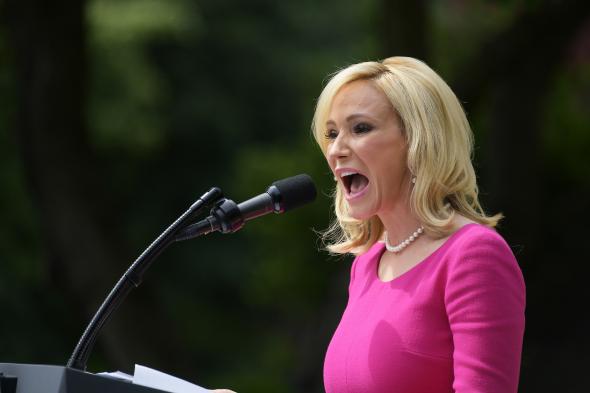Televangelist and pastor Paula White has known Donald Trump since the early 2000s, and she is thought to be the president’s closest spiritual adviser. She prayed at his inauguration, appeared with him when he signed his executive order easing restrictions on pastors engaging in politics, and told evangelical TV host Jim Bakker she is in the White House at least weekly these days. This week, as Trump faced sustained criticism over his response to the violent white-nationalist rally in Charlottesville, Virginia, she proved her loyalty once more, appearing on the Jim Bakker Show to defend Trump’s presidency and his spiritual bona fides in apocalyptic terms. While White has condemned white supremacy as evil and has a racially mixed fan base, she didn’t mention Trump’s equivocations that have roiled the nation.
Instead, she made an extended comparison of the president to the biblical figure Esther on Bakker’s show Monday in an interview that at times sounded more like an impassioned sermon. Like Esther, White said, Trump is a come-from-nowhere figure elevated to leadership against all odds in order to do God’s will. She described Trump as a generous, humble man of “character and integrity” and vouched repeatedly for the state of his soul. “He surrounds himself with Christians, and he is a Christian,” she told Bakker, about a man who’s been widely reported as being irreligious for most of his life, prompting applause from the studio audience. “He loves prayer.”
White didn’t need to convince Bakker’s audience that a flawed man can be redeemed to do the Lord’s work; the Bakker himself went through a high-profile sex scandal in the 1980s and later spent time in jail for mail and wire fraud before returning to ministry. White’s case for Trump’s divine mission was based not on his character, but on the future of the Supreme Court and other judicial appointments. To White, Trump is doing exactly what conservative Christians elected him to do. She called the appointment of Neil Gorsuch to the Supreme Court a “miracle” and spoke fervently about future court appointments. “We’ve got 130 vacancies in the lower courts, and he is appointing exactly what we asked for. … We wanted originalists; we want constitutionalists,” she said. “Right now, we’re scaring the literal hell out of demonic spirits by me saying this right now,” she added, indicating she sensed her words were summoning opposition from dark forces.
In adamning investigative piece written for the now-shuttered conservative site Heat Street, Jillian Melchior reported this spring on her dubious record as a televangelist and pastor. White’s church outside Orlando, Florida, attracts an almost exclusively black audience, many of whom have low incomes and little savings. That doesn’t stop White from asking for what they have. White asked congregants to donate up to a month’s salary as a one-time special offering to mark the beginning of the year. At her previous church, White often asked congregants to donate jewelry and other valuables, which White would later sift through herself and pluck out valuable items, according to another pastor interviewed by Melchior. That church filed for Chapter 11 bankruptcy several years after White left.
Trump’s roster of spiritual advisers is heavy on televangelists and prosperity Gospel preachers such as White, who suggest God will reward believers for their generosity toward their churches and spiritual leaders. Even as Trump’s business advisory boards fell apart and the majority of his arts and humanities committee resigned in the wake of his response to Charlottesville, the members of his evangelical advisory board, who informally advise him on spiritual and political matters, have largely stood by him. When ABC’s This Week reached out to the administration to request someone to speak for the president, they offered up Jerry Falwell Jr., the president of Liberty University who dutifully reported that the president “doesn’t have a racist bone in his body.” A.R. Bernard, the pastor of a megachurch in Brooklyn, New York, is a notable exception. He announced last week that he had “quietly stepped away” from the board months ago and formally resigned the day of Trump’s disastrous “both sides” press conference.
Pressure is mounting on the group from other corners of conservative Christianity. Some Liberty students are returning their diplomas as a protest against Falwell’s backing, for example. In an interview with Emma Green in the Atlantic, advisory board member Tony Suarez, the executive vice president of the National Hispanic Christian Leadership Conference, argued that much of the group’s work with the president is invisible. Just because they aren’t rebuking him publicly, he implied, does not mean that they aren’t delivering bracing truths in private. “I can tell you there have been legitimate, straight meetings where we delve into these issues,” he told Green. “There is an open door from the Oval Office to be able to express praise, criticism, and concern to the president. And he receives it.”
But critics are skeptical that Trump would tolerate criticism from his religious advisers, given his apparent inability to accept criticism from anyone else. “What is Trump doing with them if he’s not listening to them?” Bryan McGraw, a political scientist at evangelical Wheaton College, said by email. “Using them as props in his White House Reality TV Show.” As long as Trump is able and willing to make conservative judicial picks, it appears White has no temptation to critique the man she believes has been installed by God to the hall of power—and who has brought her right along with him.
